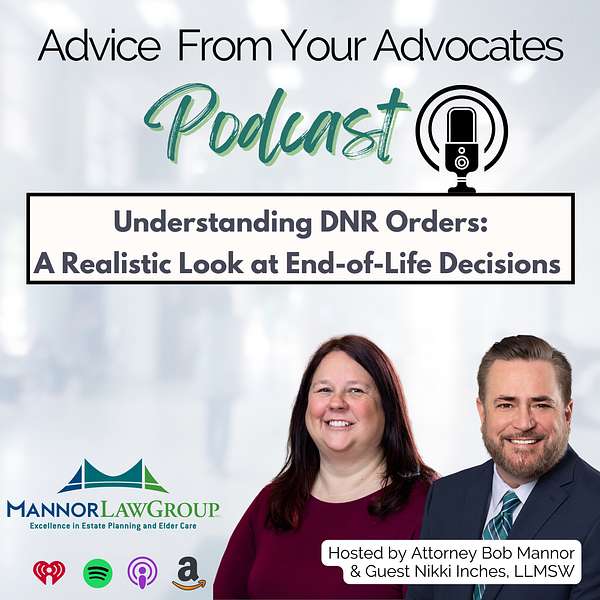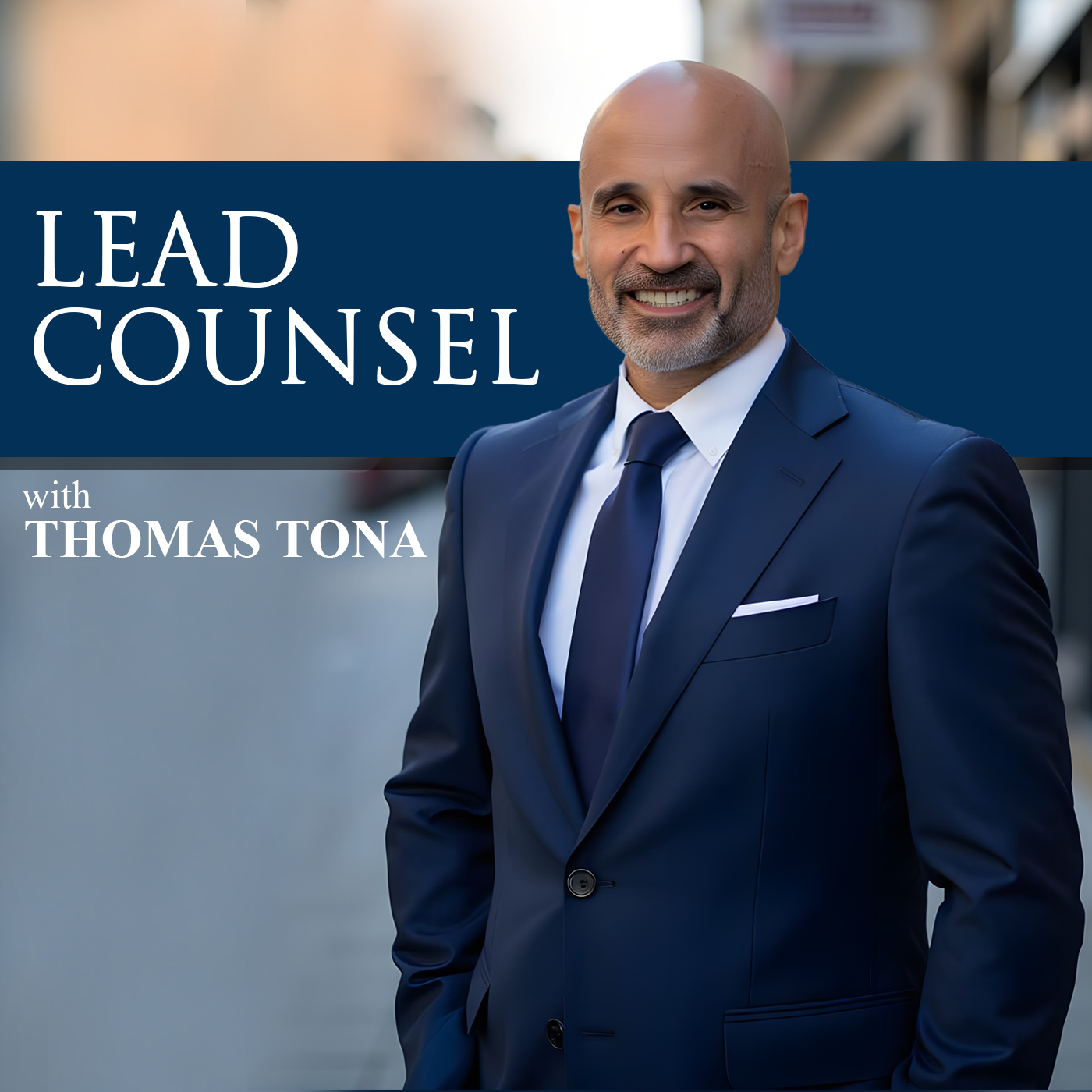
Advice From Your Advocates
Advice From Your Advocates
Understanding DNR Orders: A Realistic Look at End-of-Life Decisions
Do Not Resuscitate orders or DNRs: chances are you've heard of this document, but many are unsure exactly what it means. If you've wondered about DNRs, their implications, and the myths surrounding them, this episode will enlighten you.
We welcome back guest, Nikki Inches, a resident care navigator and social worker at Mannor Law Group, who shares her expansive knowledge on DNRs, helping us differentiate them from healthcare power of attorney or patient advocate designations. Host Bob Mannor and Nikki delve into this realm, exploring what a DNR actually entails and the conditions under which it comes into play.
Nikki & Bob demystify the actual stipulations of a DNR - it's an order, signed by oneself, witnesses, and a physician, that one does not want chest compressions started if their heart stops beating. But who gets to make this crucial decision and when should this topic be discussed? We venture into these critical aspects, highlighting the importance of having this dialogue, especially in light of dealing with dementia patients. Tune in to our insightful conversation as we take a realistic look at end-of-life decisions and their importance, regardless of age.
Executive Producer: Savannah Meksto
Assistant Producer: Andria Conner
Listening Options
YouTube Playlist
Apple Podcasts
Spotify
Amazon Music
iHeart Radio
Podcast Addict
Podchaser
Deezer
Listen Notes
Player FM
ABOUT US:
Mannor Law Group helps clients in all matters of estate planning and elder law including special needs planning, veterans’ benefits, Medicaid planning, estate administration, and more. We offer guidance through all stages of life.
We also help families dealing with dementia, Alzheimer’s disease, Parkinson’s disease, and other illnesses that cause memory loss. We take a comprehensive, holistic approach, called Life Care Planning. LEARN MORE...
You're listening to Advice from your Advocates, a show where we provide elder law advice to professionals who work with the elderly and their families.
Bob Mannor:Welcome back to Advice from your Advocates. Today we have a very good topic that people really need to know about, and it is about DNRs. Do not resuscitate orders. Okay, and our guest is Nikki Inches, one of our resident care navigators and social workers here at Mannor Law Group. Welcome, Nikki, Hi.
Nikki Inches:Hello.
Bob Mannor:So Nikki has a lot of expertise. She's worked with hospice organizations, she's worked a lot with the DNRs do not resuscitate orders, and so we're going to get her insight on this and I think this is going to be really valuable for people to really understand what a DNR is and what it isn't. So I'd like to first, if it's okay with you, talk about what it isn't, absolutely so. A lot of people come in and they're 50 years old, 60 years old, they're jogging, they ran the CRIM, they you know, they're in perfect health and they say well, don't forget, we need a DNR. No, you don't, you. What you're probably looking for is a patient advocate or healthcare power of attorney. So in Michigan, what we need is and we'll talk about other states too but in Michigan you need a. Some people call it a patient advocate, some people call it a healthcare power of attorney, but it's where you appoint someone else to be able to make healthcare decisions, including end of life decisions, which is what kind of the DNR concept is. But end of life decisions are discontinued medical treatment in the event that you can't do it yourself. So those documents only take effect if you can't make the decision. Even once you sign those. You always get to make the decision yourself. It only takes effect if two doctors have certified that you're not capable or you're unconscious and you can't make the decision yourself. And it usually involves things like end of life and respirators and ventilators and things like that. So that's how we handle that when you're healthy and when you're. You know we wouldn't want a DNR, which we'll talk about in a minute.
Bob Mannor:In other states they use something called a living will. Some people will sign living wills in Michigan but we they're not preferred by the law, by the courts in Michigan, to have a living will which just states under what circumstances you wouldn't want to receive treatment, you wouldn't want to be on a respirator, ventilator, things like that. And the concept of that is it's enforceable on its face. They don't have to check with your spouse, they don't have to check with your kids, they don't have to check with your parents or whoever it is that you love and trust to help make that decision for you. So in Michigan it's a little different. You've got to appoint somebody to convey your wishes for you. In other states you can have that living will where it, just on its face, can be enforceable. So none of those are DNR. Sometimes people confuse the language a little bit, so now let's talk about what is a do not resuscitate order, a DNR, nikki, what is a DNR?
Nikki Inches:So a DNR is a paper that you will talk about with your physician, you will talk about with your family. It is an order that is signed by yourself witnesses and your physician that states that in the event that your heart stops beating, that you stop breathing. You do not want chest compression started.
Bob Mannor:So it's primarily for resuscitation, correct? Okay, I used to, and I was half joking and you corrected me one time when I said this that if you have a DNR, that means that they won't give you the Heimlich maneuver if you're choking on a chicken bone and you correctly corrected me that said nope, bob, you're wrong, they will still give you the Heimlich maneuver.
Nikki Inches:Yes, and that's important to know. It is important to know because it doesn't include those things leading up to. They're still going to try and help you up to the point that they would start compressions, but you're saying please don't start compressions on me Okay.
Bob Mannor:So what would be an appropriate? Well, who makes that decision, I guess is the most important.
Nikki Inches:So Ultimately, as long as you're able to, you make that decision yourself. Ideally, that is a decision that you will make, you will talk to your physician about, you'll talk to your family about. In the event that you are not able to make that decision, it depends on the circumstances in a nursing home or skilled nursing facility type situation. The only other people that can sign that for you are your legal representative. So, whether it's your healthcare power of attorney, it is your guardian, somebody like that. It cannot be a next-up kin that doesn't have that authority.
Bob Mannor:Yeah, so it's difficult sometimes. We often advise or do trainings for people that work in nursing homes and that is the biggest question that we ever get what if they don't have a power of attorney in place, a healthcare power of attorney, a patient advocate? How do we know whether or not that we should resuscitate or not? You're right. You either have to have that or a court order. To the extent, this is really interesting. Many years ago in Michigan, even a guardian couldn't sign a DNR. Now, and for many years, a guardian can sign a DNR. So if you're a court-appointed guardian, you can sign a DNR, or if you're appointed by the person as their patient advocate or healthcare power of attorney, you can sign a DNR. That's very important that we have that option. Talk to us a little bit more about what is the conversation, under what circumstances this can be brought up, or should the family maybe bring it up?
Nikki Inches:Typically, it's brought up as we see our health declining. We're watching our family go through things. Maybe they have received a terminal diagnosis and they've decided that they don't want to continue treatment. At that time, it might be appropriate to say I'm not doing any more treatment and so I want to let things happen naturally. Therefore, I want to have the DNR in place, Sometimes as the healthcare power of attorney or guardian or whatever it may be, as we're watching, maybe mom is declining into her dementia diagnosis and she's not the same person she was and not able to take care of herself and is not remembering to eat and do those things. Are we wanting mom, if her body decides it's time to shut down? Are we wanting to make that decision to do CPR and keep her with us, or are we wanting to make that decision to let her body do what it's trying to do? Those are some of those instances where you'd be looking into is it time to make that decision?
Bob Mannor:That's a great way of saying that. I was going to bring that up about dementia. That's a more difficult issue than if somebody is terminally ill and they can, verbally, they can articulate that they don't want that. But it's very hard for families when somebody has dementia and then they've never articulated that. We never have anything in writing that articulates that, but it is a conversation that should be had. Is this what we know about mom, what we know about dad? Would they want this and should we consider a DNR?
Nikki Inches:in that case, absolutely. I think, even if the DNR isn't signed, those conversations are important to have anyway, because we never know when something might happen. Having those conversations about what are my wishes, so that we have that person who's able to help in those situations.
Bob Mannor:Excellent. Appreciate you, nikki. This has been a very good conversation, a very important conversation for families to have. I know it's not easy, but it's important that you have that conversation honestly, regardless of your age. So I appreciate you coming to Advice from your Advocates. Thanks for listening and don't forget to subscribe to Advice from your Advocates on any of the podcast platforms.
Nikki Inches:Thanks for listening. To learn more, visit mannorlawgroup. com.
Podcasts we love
Check out these other fine podcasts recommended by us, not an algorithm.

Great Practice. Great Life. by Atticus
Steve Riley
